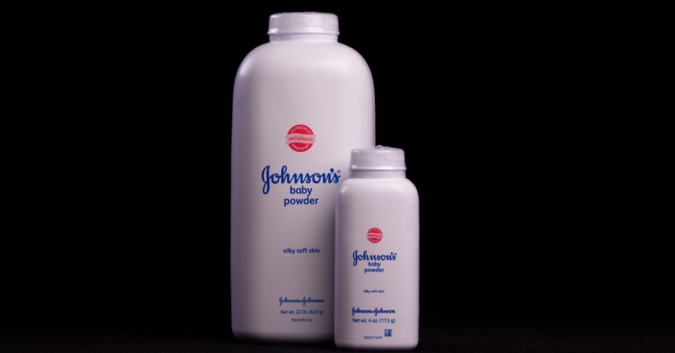On May 19, 2020, Johnson & Johnson announced it will be discontinuing sales of its iconic talc-based baby powder in the United States and Canada.
The company’s decision comes as it faces over 19,400 cancer lawsuits in the U.S. alleging that the talc in Johnson’s® Baby Powder and other talc-based products was contaminated by asbestos — a lethal toxin known to cause cancer.
Evidence produced in court proceedings shows Johnson & Johnson knew about the asbestos risks in its talc-based products, and that the company actively avoided disclosing this information to consumers.
Johnson’s Baby Powder, which has been a brand-defining product since 1893, is largely responsible for shaping the company’s wholesome, family-oriented image. An image, consumers say, that has rung false for decades.
Despite Decision, Johnson & Johnson Stands by Its Baby Powder
Johnson & Johnson’s voluntary decision to stop selling talc-based baby powder marks a major shift in the company’s approach to dealing with consumer complaints but is still far from an admission of guilt.
In a statement, Johnson & Johnson said it “will continue to vigorously defend the product, its safety, and the unfounded allegations against it and the Company” in current and pending talc lawsuits.
As part of its move, Johnson & Johnson will allow existing bottles of baby powder already on store shelves to continue to be sold until they run out. In the U.S. and Canada, the company has seen year-over-year sales decreases in talc-based baby powder, due to public outcry and the number of injured consumers who stepped forward alleging baby powder as the cause of their cancer.
The company elaborated,
“Demand for talc-based Johnson’s Baby Powder in North America has been declining due in large part to changes in consumer habits and fueled by misinformation around the safety of the product and a constant barrage of litigation advertising.”
Nowhere in its statement did Johnson & Johnson acknowledge the thousands of individuals who have died or developed life-threatening cancers as a result of their use of baby powder.
While Johnson & Johnson ends talc-based baby powder sales in North America, it will continue sales of talc-based baby powder in other parts of the world where the company is not facing such public scrutiny and legal opposition. In the U.S. and Canada, the company will continue to market and sell the cornstarch-based version of its baby powder.
Consumers Claim Failure to Warn, Company Claims ‘Misinformation’
Though Johnson & Johnson maintains that its baby powder is safe and free of asbestos contamination, researchers, doctors, and, above all, American consumers — many of them women who now have ovarian cancer — say otherwise.
Many people who have developed cancer alleged to be linked to use of Johnson’s talc-based baby powder rightly say they should have, at the very least, been warned of the potential asbestos dangers that the company had acknowledged internally. Knowing this information could have protected consumers, helping them make more-informed decisions on their purchases.
Recent litigation has revealed that the company had been concerned for at least 50 years about the possibility of trace amounts of asbestos in its talc.
Asbestos is the only known cause of mesothelioma, a lethal cancer that has no cure. Most often, mesothelioma develops in the lining of a person’s lungs — the mesothelium — though it can develop in the lining of the heart and abdomen as well.
The link between ovarian cancer and asbestos was first established in 1958 — about a decade before internal memos show Johnson & Johnson started worrying about the presence of asbestos in their talc.
A Major ‘Victory for Public Health’
Talc is the softest naturally occurring mineral in the world. Mined from metamorphic rock formations within the earth, talc occurs in nature alongside asbestos. In fact, the two are often found underground together, intermingled.
Extracting talc, processing it, and then bottling it for sale does not guarantee that by the time the talc is purchased and brought home for use that it is free from asbestos.
In October 2019, Johnson & Johnson recalled 33,000 bottles of baby powder following the results of a random U.S. Food and Drug Administration (FDA) test that detected the presence of asbestos in a bottle of Johnson’s Baby Powder purchased online. The company then conducted its own tests — showing no asbestos contamination. The FDA stood by its findings.
Illinois Rep. Raja Krishnamoorthi, who is the Chairman of the Subcommittee on Economic and Consumer Policy celebrated Johnson & Johnson’s announcement, saying,
“My subcommittee’s 14-month investigation revealed that Johnson & Johnson knew for decades that its product contains asbestos, and the company fought to keep using a testing method that never would have allowed it to be detected. Today’s victory means that children and families no longer will be endangered.”
Johnson & Johnson’s decision to stop selling talc-based baby powder marks a tremendous victory for American consumers, though the fight is far from over.
